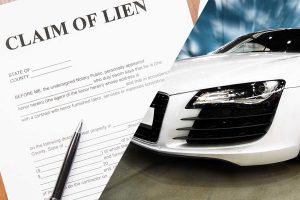Selling a car involves a lot of paperwork, not to mention time. But dealing with a financed car can be more complicated. How can you sell a financed car, and what steps are necessary? We've researched the subject to provide the most comprehensive answer possible.
You can sell a financed car in limited circumstances, such as:
- If a dealership buys the vehicle
- When you legally transfer responsibility for the loan or lease to a new owner
- If the car is worth more (or sells for higher) than the loan balance
Many factors affect whether (and how) you can sell a financed car, including whether the lender grants you permission to transfer it.

Read on for more details on transferring and settling debt on your vehicle.
Who is the Legal Owner of a Car on Finance?
Technically, the legal owner of a financed vehicle is the lending institution. Whether that's your bank, credit union, or the dealership where you bought (or leased) it, you aren't the sole owner unless you have a title that says so. Another way to describe a financed vehicle is a car with a lien on it. The lienholder, AKA, the bank or other lending body, is part owner until you pay off the debt. At that point, you'll receive a clear title to the car and can sell or transfer it.
Of course, you can also have a lien on an automobile that is no longer financed. For more information on liens—including how they work if you want to sell your car—see our related post, What is a Lien on a Car? While your name is on the title, there's an invisible stipulation that the lender must get their money before you're the sole owner. This means that you can still sell a financed car—it's just more complicated than selling something you own outright.
Can't Afford Car Payment - What Are My Options?
Not being able to afford a car payment is something many consumers struggle with. Whatever "good deal" you started with can easily turn bad, especially since vehicles lose their value the moment they drive off the lot.
That said, there are options to handle your financial responsibility even if you can't pay the balance on the loan.
Can Someone Else Take Over My Car Payments?
Someone can take over your payments, but doing so without a formal agreement can mean bad news for both you and the prospective buyer.
By having someone else make the payment for you, you aren't removing your responsibility for the automobile.
If the person who's making the payments gets in an accident, you could be on the hook legally and financially. Since your name is still on the title, you're the liable party, even if you don't own it outright. On that same note, if the person who promises to make the payments stops doing so, you are still responsible for the loan balance. In short, there are too many variables at play for this to be an excellent financial option for most consumers.
However, you can transfer your car loan to another person. Often, this requires additional steps, paperwork, and the permission of the lienholder. You can learn more about car loan transfers in our related article, Are Car Loans Transferable?
Can Someone Take Over My Vehicle Lease?
In a lease situation, since you don't (and won't) own the car once the final payment is made, transferring the lease is another worthwhile avenue to explore. The new lessee makes the payments, and they reap any financial benefits of paying the lease off.
You might be able to find someone to take on your lease by searching online sites. However, you should proceed with caution and always have a binding agreement in place before handing over the keys (or vehicle title).
Can Someone Else Pay Off My Loan?
While allowing someone to take over your car payments isn't usually a good financial move, some loopholes allow another person to pay off your loan.
If you negotiate the transaction with the buyer and complete the necessary paperwork (including permission from the lienholder), you can take payment for your car and pay the remaining loan balance. Technically, this doesn't mean someone else is paying off your loan. Instead, they're buying the vehicle from you, and you're using the proceeds from the sale to pay the lienholder what you owe.
Still, this can be a good option if your car is worth enough that the loan balance is lower than the value (and sales price) of the vehicle. Selling privately can be beneficial for this reason, too, as you're more likely to net a higher price than if you sold to a dealership.
Often, sellers prefer to use escrow to protect themselves and make things easier for potential buyers. Banks, attorneys, and car dealerships can act as escrow agents to facilitate a vehicle transfer.
You may want to use an escrow service if you don't know the buyer personally or want an extra layer of protection when handling financial details.
Will a Dealership Buy My Car If I Still Owe?
Many dealerships will buy cars with a loan balance on them. But it's a misconception that dealerships pay off loans for consumers as part of the deal.
In general, the catch is that the dealership isn't paying off the loan for you. Instead, you're paying it as part of the financial package for a new vehicle. The amount you owed from the previous lease or loan is called negative equity (AKA debt), and it rolls into your new car's loan. For someone who wants to trade in an older vehicle to get the latest and greatest, the move might make sense.
However, if you're trying to get out from under a loan, most dealerships won't have any deal good enough to make it worthwhile. The only way you can walk away scot-free from a financed car is if it's worth more than the loan balance.
Then, it's a great deal for the dealership—and a way for you to skip out on too-high payments.
What Do I Need to Sell a Financed Car?
Preparing to sell a financed vehicle takes some work. You need to have the right paperwork, know your car's value and loan payoff amount, find a buyer, and possibly arrange for an escrow agent to handle matters.
You will need the vehicle's title to sell it, whether you're the sole owner or not. If you pay the loan balance before handing the keys to the new buyer, you can also give them the updated title. The new title will only have your name on it, which is what you need to transfer it after the sale. You should also find out your car's value as well as request an official loan payoff amount from your lender. These figures can help you determine a reasonable selling price for your vehicle.
Finally, you'll need to market your car to potential buyers, plus source an escrow agent. These steps can help ensure a seamless transaction that relieves the burden of your unaffordable car loan.



